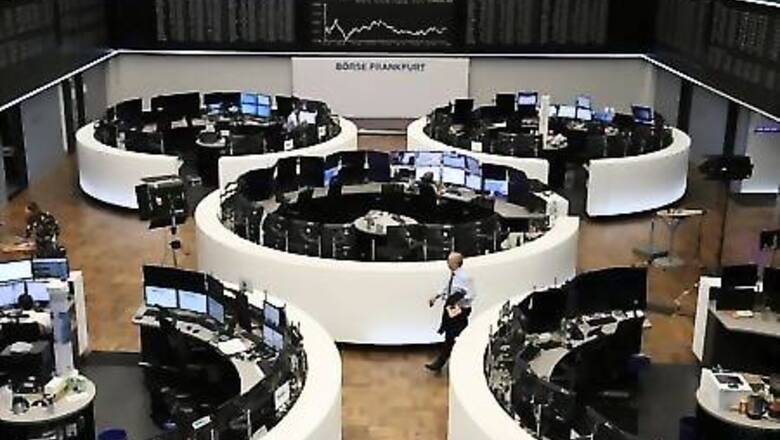
views
LONDON: Europe kept record high world share indices creeping forward on Thursday, while European Central Bank efforts to tame the euro lifted the dollar and government bond markets higher.
The promise of ongoing global fiscal and monetary stimulus remained too powerful to allow the worries about second coronavirus waves or deteriorating U.S.-China and EU-Russia relations to rein in the bulls.
The pan-European STOXX 600 index gained almost 1% [.EU], tracking Wall Street’s latest peaks and overnight gains in Asia after data there showed China’s service sector grew for a fourth straight month in August.
It kept the MSCI’s broadest index of world shares, which tracks nearly 50 countries, at a record high. The index has gained nearly 60% since collapsing in February and March when the novel coronavirus was beginning to spread globally.
Wall Street futures were a fraction lower despite a sharper than expected fall in jobless benefit claims [.N] but its roar up has been remarkable.
Apple’s $2 trillion price tag is now larger than the entire FTSE 100, $500 billion electric carmaker Tesla’s is worth roughly as much as the other auto majors combined, while the Nasdaq’s market cap has risen $1.6 billion an hour on average since March.
“The U.S. equity market just seems to go politely ploughing on and the U.S. dollar is still correcting,” said Societe Generale strategist Kit Juckes.
“I think you would have to get euro-dollar down through 1.17 before the U.S. equity market – which is probably the most overstretched of all time – might start paying attention and think something was correcting more seriously.”
The dollar’s bounce put it about 1.3% above the 28-month low it had hit against major world currencies on Tuesday. It was also on track for its first unbroken three-day gain since May. [/FRX]
The euro slipped 0.4% to $1.1803 , helped on its way by a Financial Times report that several ECB members were concerned that the euro’s rise, which saw it touch $1.20 this week, could hamper the region’s economy.
That followed remarks on Tuesday from ECB’s chief economist Philip Lane, who said the exchange rate “does matter” for monetary policy.
Westpac currency strategist Sean Callow said the FT report was “stoking some interest in next week’s ECB meeting at the very least,” while MUFG’s Lee Hardman reckoned the bank would “rely more on jawboning” for now rather than action.
Nevertheless, short-dated German bond yields – which move inversely to the asset’s price – dropped to their lowest in nearly a month as a survey showed the euro zone’s rebound faltered in August. [GVD/EUR]
Growth in the bloc’s dominant service industry almost ceased, suggesting the road to post-COVID recovery will be bumpy.
It “sends a disappointing signal that the rebound has lost almost all momentum,” said Chris Williamson, chief business economist at IHS Markit which compiles the Purchasing Managers’ Index (PMI) data.
Graphic: World stocks vs coronavirus – https://fingfx.thomsonreuters.com/gfx/mkt/azgvonylkpd/Pasted%20image%201599135262169.png
ROUBLE RUMBLED
Traders also had much to ponder in Asia and beyond.
Reports China was planning sweeping policy changes to its semiconductor industry to fight U.S. restrictions stoked concerns about deteriorating relations between the world’s two biggest economies.
China’s blue-chip index closed 0.55% lower, while Hong Kong’s Hang Seng fell 0.45% and the Aussie and Kiwi dollars buckled to take some of the shine off gains of 0.9% and 1.3% in Tokyo and Seoul .
The China chip talk came after the United States said on Wednesday it would require senior Chinese diplomats to get State Department approval before visiting U.S. university campuses or holding cultural events with more than 50 people outside mission grounds.
Shares of Chinese gaming and social media powerhouse Tencent had also fallen more than 2% after India banned 118 mobile apps, including the firm’s popular PUBG game, adding to its bans on TikTok, WeChat and UC Browser.
Russia’s rouble struggled after shedding 2.6% on Wednesday when Germany said Kremlin critic Alexei Navalny had been poisoned with a Soviet-style Novichok nerve agent, the same substance Britain said was used against a Russian double agent and his daughter in an attack in England in 2018.
German Chancellor Angela Merkel said Berlin expected Moscow to explain itself and that Germany would consult its NATO allies about how to respond, raising the prospect of new Western sanctions on Russia.
Among commodities, Brent crude fell nearly 2% to $43.54 per barrel and U.S. oil dropped just over 2% to $40.63 a barrel on expectations of weaker U.S. gasoline demand and a sluggish global recovery. Gold was slightly lower, with spot prices at $1933.98 an ounce. [GOL/]
Graphic: Rouble tumbles – https://fingfx.thomsonreuters.com/gfx/mkt/jznvnxnojvl/rouble.PNG
(Additional reporting by Olga Cotega and Jonathan Cable in London and Swati Pandey in Sydney; Editing by Kim Coghill and Barbara Lewis)
Disclaimer: This post has been auto-published from an agency feed without any modifications to the text and has not been reviewed by an editor










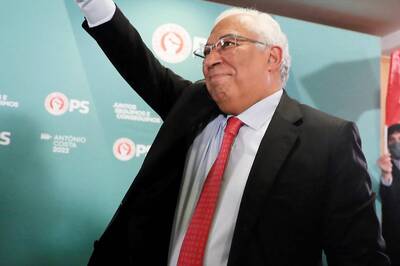
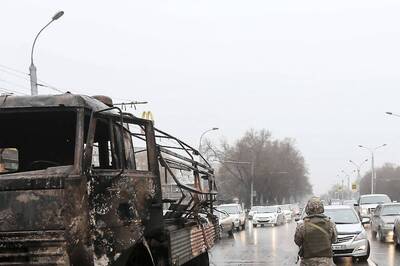
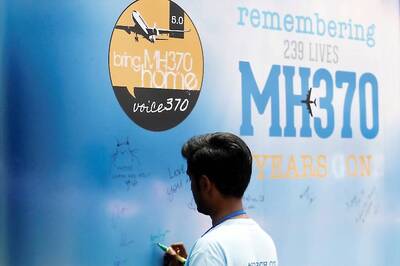


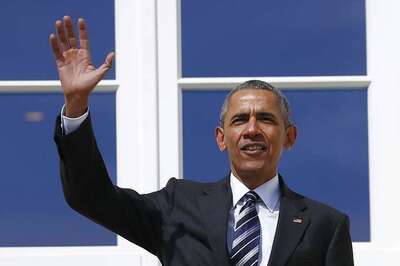



Comments
0 comment